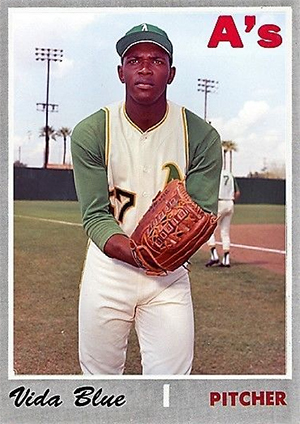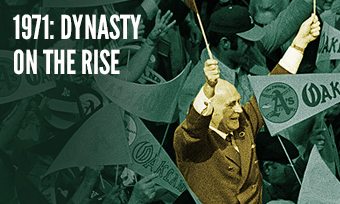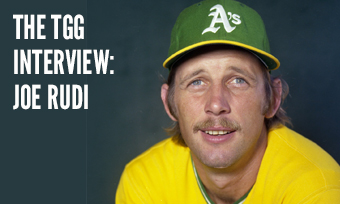The TGG Interview
Vida Blue
“One day in ’71, he offered me $2,000 to change my middle name to ‘True.’ At first, I thought he might be joking. I told Charlie no—I like my name the way it is. He did not like that and started telling everyone to call me ‘True Blue’ anyway. The P.A. announcer was forced to say it. I was pissed and I let him know.”
 Vida Blue’s MLB career spanned from 1969-86 playing for the Oakland A’s, Kansas City Royals and San Francisco Giants. Among his career stats are 209 wins, 161 losses and 143 complete games. His run in 1971 was amazing and to this day is one of the best one-year performances in the history of baseball—24 wins, eight losses, a 1.82 ERA and eight shutouts. Although Blue was a pleasant surprise in 1970, his 1971 season ranked right up there with the greatest pitching seasons of all time. The A’s rode Blue’s success to their very first postseason appearance since 1931—and then won the World Series over the next three seasons, 1972-1974. Blue won the American League’s Cy Young and Most Valuable Player awards in 1971, is a six-time All-Star, and is the first of only four pitchers in major league history to start the All-Star Game for both leagues.
Vida Blue’s MLB career spanned from 1969-86 playing for the Oakland A’s, Kansas City Royals and San Francisco Giants. Among his career stats are 209 wins, 161 losses and 143 complete games. His run in 1971 was amazing and to this day is one of the best one-year performances in the history of baseball—24 wins, eight losses, a 1.82 ERA and eight shutouts. Although Blue was a pleasant surprise in 1970, his 1971 season ranked right up there with the greatest pitching seasons of all time. The A’s rode Blue’s success to their very first postseason appearance since 1931—and then won the World Series over the next three seasons, 1972-1974. Blue won the American League’s Cy Young and Most Valuable Player awards in 1971, is a six-time All-Star, and is the first of only four pitchers in major league history to start the All-Star Game for both leagues.
As told to Ed Attanasio, This Great Game
On his High School Years:
“They did not have a baseball team at DeSoto High School, believe it or not. The principal heard I was good, so they formed a team. The scouts started showing up at my games pretty quick and that is when I heard about Ray Swallow, a scout for the Kansas City A’s. I was wild—in one game I threw a no-hitter but lost because I had 10 walks. Some people said that I was better at football; I played QB and a bunch of big colleges wanted me. I wanted to go to Houston University to play football, but my dad died during my senior year, so I decided to go for the money. I got picked by Kansas City in the second round of and signed a two-year contract for $12,500 a year.”
A Star is Born:
“In 1970, they called me up in September and I realized this was my shot, so I better take advantage of it. I pitched in the first game of a doubleheader against the White Sox and I hit a three-run home run but ended up losing. My next time out, I was much better and threw a one-hit complete game. My next start was a lousy outing against Milwaukee, but then we played the Twins and I threw the best game of my life—a no-hitter. Right after the game, (Oakland owner Charles) Finley called me in the locker room and told me that I was going to get a $2,000 bonus for the no-hitter. Man, that seemed like a lot of money to me back then! After that season, I knew I was going to be on a pitching staff with a great bunch of pitchers. I had made it.”
Finley’s Follies:
“Charlie did outrageous stuff all the time to get in the news, like orange baseballs and elephants and donkeys out on the field. One day in ’71, he offered me $2,000 to change my middle name to ‘True.’ At first, I thought he might be joking. I told Charlie no—I like my name the way it is. He did not like that and started telling everyone to call me ‘True Blue’ anyway. The P.A. announcer was forced to say it. I was pissed and I let him know. I always compare Finley with Al Davis (the former owner of the NFL’s Raiders) because both of them were not afraid of anyone or anything.”
On his Greatest Year:
“In 1971, I lost my first start and then won 10 in a row with nine complete games, and things got crazier and crazier every week. When the media gets a hold of a story, they won’t let it go and this one kept building with each win. I got on the cover of every magazine, including Time, Newsweek, Sport, Sports Illustrated—I can’t remember them all. It was crazy and there was something new every day. I started the All-Star Game for the American League that year and gave up home runs to Henry Aaron and Johnny Bench, but I got the win—the youngest in All-Star Game history. I won my 20th game in early August and then leveled off a little. I was tired, man. I threw over 300 innings that season and I started to slow down a little during the summer.”
On his First Playoffs:
“The American League Championship Series was a bigger deal back then, because now so many teams get into the postseason it’s kind of diluted it. You could tell when you ran out on the field that these games were a lot more important and you could feel the energy. I started Game One against Dave McNally in Baltimore. At first, I felt comfortable up there, like it was any other game. I had a nice little 3-0 lead going into the bottom of the fourth inning, but then Paul Blair got a big hit and beat us. We faced McNally, Cuellar and Palmer in that series and before we knew it, they had swept us.”
On his 1970 No-No:
“There are those rare starts when you know you’re dialed in, and that’s exactly how I felt when I was warming up for this game. We were facing the Twins, a strong hitting team, led by Harmon Killebrew. Every no-hitter includes a great defensive play and when Campaneris made an amazing stop in the fifth inning, I figured maybe this is my day and it was.”
Show Me the Money, Charlie:
“I asked for $85,000 and he offered $50,000 and he wasn’t going to budge. All I wanted was to be paid like a top 10 pitcher, but Charlie was always crying poor. He was saying that the team was going to go bankrupt or move to Denver. He gave me a Cadillac as a bonus after the season in 1971, hoping that I would go easy on him. I hired a lawyer and we told Charlie we wanted $115,000, knowing we had no shot. The negotiations got a little nasty and I was ready to quit, man. I took a job at a company called Dura Steel Products Company. I was ready to sit out just to get away from Finley. I did sit out until early May, but I was never treated the same by Charlie after that. There was a lot of resentment there that never went away.”
In a Giant Shadow:
“When the A’s came to Oakland, they had to play second fiddle to San Francisco because they had all the big names, like Mays, Willie McCovey, Juan Marichal, Gaylord Perry and Orlando Cepeda. Everything changed when we won five divisional titles and those three championships in a row. The Bay Area loves a winner and the Giants were not winning, so we kind of stole their thunder. Plus, going to Candlestick was always an adventure with the cold and the wind, something we never encountered on the other side of the bay.”







